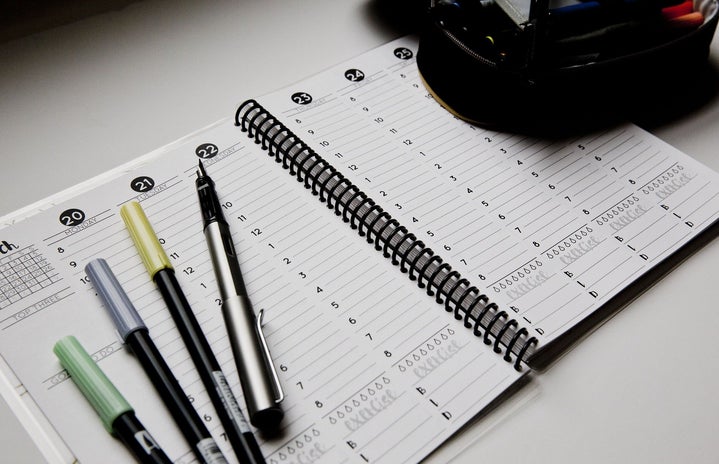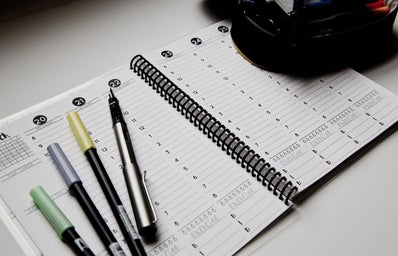It’s time to gear up for the hard reality of college: midterms. Although you may know the best study spots on campus and how to get in the zone for some much-needed study time, are you prepared for how to study for that accounting exam?
The location of a study spot helps you concentrate, but it’s the material that truly counts. There are a ton of things that go into a great study session. Here are a few tips to help pave the way to successful exam preparation. Let it never be said that collegiettes™ are unprepared.
1. Set up a schedule The key to studying well and getting the maximum amount of progress for your effort is to set a schedule for when you’re going to sit down and hit the books. It doesn’t have to be at the same time every day, but it does have to be more than once (or twice) a week. Studying every day may seem atrocious, but it’ll mean you don’t have to cram one or two days before an exam. Ideally, you want a good week before any major test to study. Look at the calendar on your phone or in your agenda to see what empty blocks you have between classes that can be used as a time to sit down and watch that microeconomics lecture you’ve been avoiding.
2. Find out how you study best Remember when you were little and wrote words on flashcards in order to memorize them? You carried them around in your backpack and whipped them out when it was time to study. Who said you had to stop using those helpful cards? Not only are they cheap, but they’re also useful for everything. Use them to write down formulas causing you trouble right before your exam; it’s simpler than carrying around an entire notebook or binder full of notes.
Ever heard of outlines? They might help you to create an overview of every topic you covered in that eastern European history class. Also, let’s thank those bookstore policies that let you highlight in textbooks. Color coordinating different highlighters might make it easier for visual learners to understand the different formulas you’re learning in calculus.
3. Stop the distractions Distractions are your mind’s worst enemy. Think about it — have you ever been in the zone, feeling like you’re getting some major work done, when all of the sudden your phone lights up with a Facebook notification? That’s the end of your productive night. If you don’t want to jeopardize your concentration, turn off your phone or put it on airplane mode.
You may also want to clean away any trash you have in your room if that’s your study location of choice. Clutter makes your mind feel unfocused and restless. Clean your space, and make it feel organized. You’ll find that once your room feels tidy, concentrating on the task at hand will be easier.
4. Office hours are gold Professors have office hours for one reason and one reason only: to help you. Don’t ignore the office location, the time when he or she is available or their email on the syllabus just because you think you won’t use it. Always ask questions before or after class in addition to visiting them in their place of hibernation (a.k.a. their office). You’ll be surprised at how open and friendly they are once you show them that you care about the material and performing well in their class. Showing interest is the best form of flattery, which can lead to better grades.
5. Know when to stop Don’t fall into the trap of studying for hours and going to sleep at 6 a.m. Take a break to give your mind time to process what you’ve just gone over. Although it may be difficult to know when to stop, you should pause any note taking by the time you get hungry, feel tired or can’t focus any longer. The brain knows when it can’t take in any more information, and that’s usually late at night. Breaks for coffee, snacks or just surfing the Internet are encouraged by your fellow collegiettes™, but don’t make the break last the entire night. You’ll find that after your breather, it’ll be easier to return to chemistry.
6. Relax Don’t stress about what you don’t know. Ask yourself what material you feel comfortable with, and then tackle the unknown slowly and with patience. Learn to let some things go and relax when you feel nervous before an exam. Have test anxiety? Here’s a tip: Chew gum during a test, and take deep breaths. Chewing will ease your anxieties and give your body something to do as your brain focuses on what’s at hand.
College is the time in your life when studying really is a make-it-or-break-it deal. Preparing ahead of time will give you an early start on reviewing materials covered in class weeks before the exam. Don’t worry about what your friends are doing in order to prep. Focus on yourself and what works best for you because they’re your grades in the end. Make sure to give yourself enough breaks to let the information sink in. Follow these tips, and you’ll be sure to ace that American history final. Good luck on your midterms, collegiettes™!
Photo credit: www.pinterest.com

